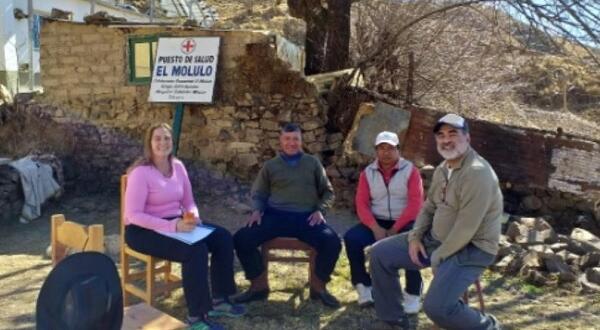Training begins this Monday for staff at the El Molulo health post for the implementation of equipment that will transform it into a Mobile Diagnostic Centre. It will be possible to carry out studies that will reach the doctors remotely.
This locality is located in the high valleys of Tilcara, a 10-hour mule ride from the hospital in Quebrada. This project is the result of a synergy between the company EXO, the National University of Jujuy (UNJu), the Federal Telemedicine Network, the National Ministry of Health, the Jujuy Maternal and Child Hospital and the Salvador Mazza Hospital in Jujuy.
The Mobile Diagnostic Centre costs approximately USD 6,000 and is on loan to the university. It allows remote use of clinical diagnostic tools, auscultation, electrocardiograms, blood pressure and temperature measurements.
The equipment is similar to a notebook. Through it, in 15 minutes anyone can do the studies, which are then uploaded to the cloud via satellite connectivity. In this way, the doctor can view it from anywhere.
For its operation, connectivity is provided by the Buenos Aires foundation Aprendiendo Bajo la Cruz del Sur, which also provides internet to the school. This is the same equipment used by the armed forces at bases in Antarctica.
Fernando González, in charge of social responsibility at EXO, arrived in Jujuy to sign the agreement that makes the project possible. "In this way we can bring doctors to any place, because specialists can look at the studies anywhere in the world," he explained.
The equipment will be installed at the health post next month. The connectivity will come from the School 76 "Juan Ambrosetti", said Paz Bossio, Digital Health referent of the National University of Jujuy and director of the project. She also pointed out that the equipment, being mobile, can be transported to patients' homes.
"We are going to work together with the Salvador Mazza Hospital. We have the equipment, the connectivity, but they have the experience in the territory," said the doctor, adding: "The idea is to gain experience that will be useful for other areas, because Molulo is not the only place in this large Argentina, which is so isolated.
Cecilia Coria, a paediatrician at the local hospital, appreciates this new opportunity: "For us as doctors it changes a lot. We will be able to carry out a healthy child, diabetes or hypertension check-up every month from there, without having to go down to Tilcara".
The difference is crucial, he said, because in an emergency we often "go blindly to the rescue". With this equipment, however, we will have a better understanding of the situation.
For Coria, it is also noteworthy that "the project is not only aimed at the medical aspect, but also involves psychology and social assistance".
Paz recalls that it was in Tilcara that the health doctor Carlos Alvarado started up the first Primary Health Care (PHC) system in Argentina in the middle of the 20th century. And he acknowledges the efforts of Federico Aden, who created telemedicine in the province of Jujuy.
The training began this Monday morning at the Tilcara Municipal Hall, with the participation of Paz Bossio, from the university; Federico Aden, from the Telemedicine Co-Direction of the Maternal and Child Hospital; Fernando González, from the EXO company; Marcelo Cuevas, from the Federal Telemedicine Network, and Ximena Salinas, Leonardo Grojsman and Cecilia Coria from the Tilcara Hospice.
On this day, the company EXO will also sign the agreement with the rector of the UNJu, Rodolfo Tecchi, in the building on Bolivia Avenue in San Salvador de Jujuy.
The Digital PHC project: Social and Health Innovation in Telehealth in the Original Community of Molulo - Quebrada de Humahuaca, is part of the Innovative Projects in Health of the National Ministry of Health.
El Molulo gains access to health care with a Mobile Diagnostic Centre



